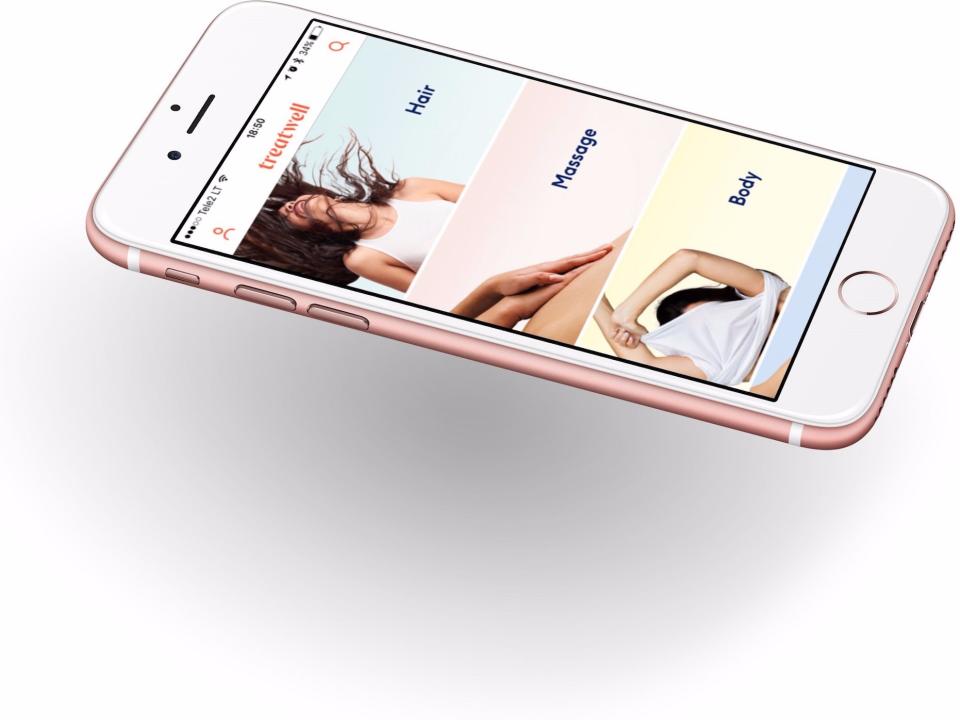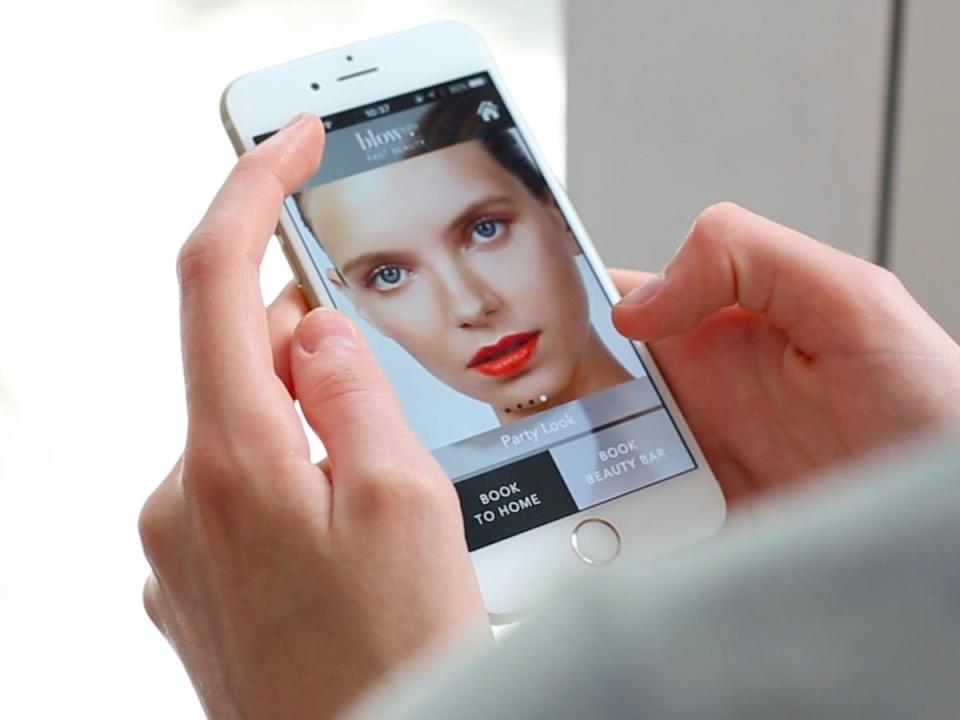This 44-year-old CEO is shaking up the £87 billion beauty industry

Treatwell
LONDON — Gone are the days of waiting until lunchtime so you can make a quick call to a salon to book a hair appointment.
Now, a number of companies are making it the norm to book anywhere, anytime — and some even bring the beauty treatments to you.
44-year-old Lopo Champalimaud is the CEO of Treatwell, just one of the companies bringing the beauty world into the digital age.
Treatwell is a 24/7 beauty booking platform available through a website and app. It claims to be the biggest in Europe, spanning 12 countries. The UK is its biggest market and works with over 20,000 salon partners.
It features both "fancy places that get all the press," as well as what Champalimaud calls "hidden gems" — smaller independent salons that "you never knew existed" where you get "a great service at a good price."
Champalimaud, who grew up in Montreal, Canada, spent some time living in New York, and moved to London in 2001. He first worked for a small private equity firm, then founded an online market research startup. This led him to London, where he headed up the European office before running the lifestyle business for Lastminute.com.
"We had a small spa business [at Lastminute.com] using ticketing technology," he said. "There was a lot of demand for spa, but I thought what about everything else — hair, beauty, and all those other services?"
"The more I looked at it, the more I realised it was a really big industry. Hair and beauty services across Europe is a €100 (£87) billion market, but it's super fragmented — there are tens of thousands of suppliers. All the chains make up less than 3% of the market."
"There's been billions spent on music, and this industry is 10 to 15 times bigger just in Europe."
Breaking down the barriers to booking
Instagram Embed:
http://instagram.com/p/BRG65h1h-O0/embed/
Width: 658px
He ultimately came up with the idea for Treatwell (originally called Wahanda) when he was hunting for a massage one evening.
"I was walking home and it was late at night, so I started looking for a new place to go," he said. However, places were closed, fully booked, or didn't respond to emails or calls. "By the end of the day, I didn't actually have that massage."
While most salons have websites and review sites like Yelp rate many of them, Champalimaud said he couldn't search for a specific treatment, check availability, see menus, or book at any point in time.
"The barriers to making the booking were so immense that I didn't spend any money. I thought, 'There's got to be a better way.'"
In 2009, along with a group of developers and a co-founder who Champalimaud says "left after a very short time," he created Wahanda, an "Opentable for spas and salons." Champalimaud said the company expanded from one country to 12 in 18 months and made a "couple of acquisitions."
"We found ourselves with five different brand names in those 12 countries," he said. "In the UK we were Wahanda. We bought a company in Holland called Treatwell, and we liked the name — it made more sense for all of our different markets, so we changed it in January last year." The initial acquisition of Treatwell cost $38 million (€34 million), according to TechCrunch.
Now, he says the business has roughly 500 employees around the world, 150 of whom are based in London. In 2016, it reported that it had 10 million users and was projecting $108 million (£84 million) in sales for the year. Champalimaud says it is 15 to 20% incremental business to its salons, and 20% of bookings at a salon are coming through its platform.

Treatwell
People don't want to book Brazilian wax's at work
Treatwell aims to make things easier for the consumer by giving them more choice, helping them make an informed decision, and allowing them to book whenever they want.
According to Champalimaud, more than 50% of bookings through the platform are made when a salon is closed, and 20% are made within three hours of the appointment time. It shows people want to make bookings anywhere, anytime. The platform also gives them a sense of privacy they don't get by booking over the phone.
"My sister used to work at Goldman Sachs, and she said to me, 'You try booking a Brazilian [wax] on the trading floor,'" Champalimaud said. "You just don't want to have to have that conversation on the phone."
Treatwell allows users to leave detailed, starred reviews on the places they visit — and even encourages them to do so through discount vouchers — which helps to get the more off-the-radar venues on the map.
Champalimaud said while there is "inherent loyalty" in the beauty market, this is "socially demographically based."
"Younger women are a lot less loyal than the older generations — there's more choice, so they change more," he said. "Just as it happened in fashion — people used to be head to toe with one designer and now you match your Zara top with an expensive handbag — the same thing is happening in beauty. It's not about big brands at the end of the day."
And to keep people coming back he said the site uses targeted promo codes.
"The vouchers we provide are fundamentally a customer retention and acquisition tool," he said. "You can do it intelligently so it doesn't effect the luxury positioning."
"We tend to do it more early days in a market, and as it matures, there's less and less of it. We still do them, but they're more triggered based on someone's behaviour — if they haven't purchased in a while."
'90% of salons still use pen and paper'
Instagram Embed:
http://instagram.com/p/BT4C_hRFD6F/embed/
Width: 658px
While Treatwell aims to make things easier for the consumer, it's also the salons that need the tool. Champalimaud said 90% of salons still use pen and paper or something like Google calendar.
"From the beginning, we developed software, which we launched in 2012, which helps the salon manage their business," he said. "Even the software in big salons is out of date."
The software helps the salons manage their diaries, employees, and cashier system. "We give it to them essentially for free — for a small monthly fee — and it allows us to see their availability," he said. "In seeing that, we'll deliver customers to them, and they pay us a percentage of the transaction — between 15 and 20%, depending on the country. If we don't send any customers, we don't make any money."
He said Treatwell is also trying to give salons the tools to be smarter about pricing.
"For instance, we think it's crazy that a haircut costs the same on Monday morning as it does on Saturday afternoon. There are no price fluctuations happening in the industry. We're introducing that."
'Tough business to start'
Instagram Embed:
http://instagram.com/p/BR3KMXmlCLB/embed/
Width: 658px
It wasn't always an easy sell, however. Champalimaud said it was "a tough business to start" for a couple of reasons.
Firstly, nobody had done it in the US, so they had nothing to model themselves after for the UK.
"If you look at Deliveroo, they were off the back of Just Eat, who taught people to think about [food delivery]," he said. "Our building blocks aren't as direct. We're doing all the heavy lifting ourselves."
He also said the initial response from his team — who were largely male — was, at the time, sexist.
"At one point there were seven guys sitting in a room and I said, 'This is not going to work. This business is 70% about women — I can't have seven guys talking about this.'"
"Men have no idea how big this industry is, and there were a lot of misconceptions about it," he added. "Some of it was truly sexist. One [man] asked me how women would pay for their services online with credit cards, because their husbands might find out what they're spending money on."
"I think our customers are fairly independent women who spend the money on whatever they want. But they were legitimate questions I was getting. So we started building out other parts of the business."
He cited a study which showed that when you 100 women were asked if they believe feeling beautiful makes them happier, 80% said yes. Champalimaud said a typical man's response to the question would be: "What the f*** does beauty have to do with happiness?"
"But we were never trying to tell people how to be more beautiful," he added. "Our rebrand tagline was 'Book yourself fabulous.' It’s an emotional state, a sense of feeling good about yourself, and we believe that whoever you are, however you want to look, whatever it is that makes you feel better about yourself, there's a sense of confidence and there is a relationship to happiness that comes from that."
Facing competition from on-demand beauty

blow LTDAnother challenge Treatwell is facing is competition from other companies trying to change the way people access their beauty treatments — particularly those offering on-demand services.
blow LTD, which claims to be the UK’s largest and fastest growing on-demand beauty services company, offers users the opportunity to book beauty services like blow dries, makeup, nails, massage, waxing, pilates, and yoga through an app and have a specialist come directly to their home, office, or hotel to deliver the treatment with a matter of hours.
The company claims it is growing at a rate of over 20% month by month in London. It also recently announced £3.5 million in funding from Unilever Ventures to push into Manchester and other cities. Companies like Ruuby and Misbeez also offer similar services.
Champalimaud is dismissive of his rivals. "They're all tiny, tiny businesses," he said. "They get a lot of press and attention, but no scale."
He added that along with the fact that many people look forward to the "salon experience," the businesses are also expensive, and only work for a "certain demographic" of women.
"You have to pay for at least an hour of down time between travel and set up," he said. "I think it has its use, but I don't think it's for everything and everyone. It has an application and there will be some successful businesses built, but it's going to be for a very wealthy woman is a very particular part of town."
'The transformation is coming'
Despite the influx of mobile beauty options, Champalimaud says that less than 5% of the market is online — a surprisingly low figure — and most women are still booking hair and beauty on the phone, by walk-in, or via text.
However, with the platform signing up 1,000 new salons a month, he's confident this will change.
"We're in 37 cities, are number one in 36 of them, and in the last one we’ll be number one by the end of the year," he said. "In 10 years time, you will not be picking up the phone or using a piece of paper and pen. The transformation is coming."
NOW WATCH: An Indian barber is using fire to cut people's hair – and nobody's complained so far
See Also:
SEE ALSO: Inside the 'ethical luxury brand' supplying high-end hotels with soap made by the blind and disabled

 Yahoo News
Yahoo News 

